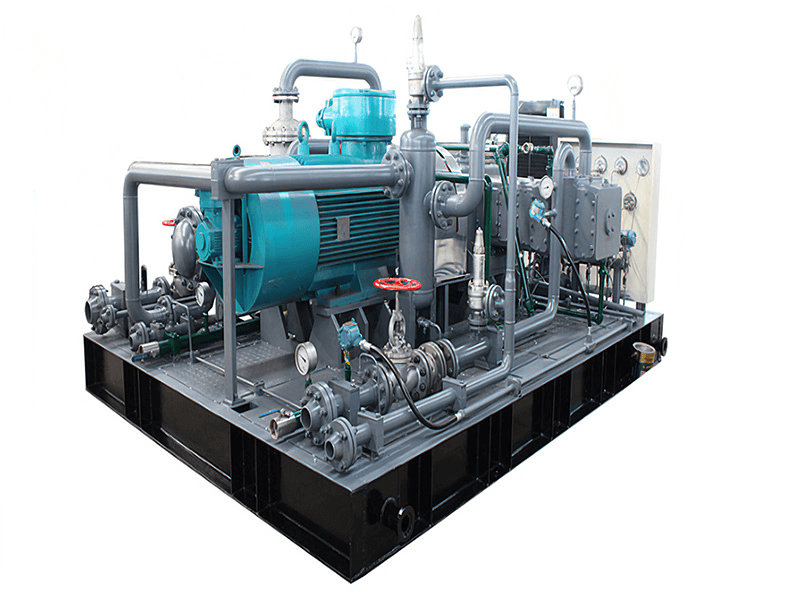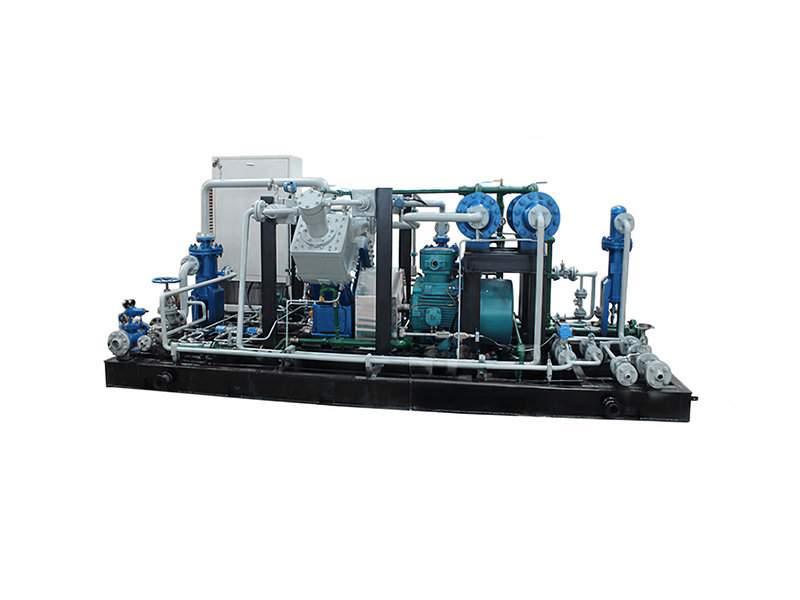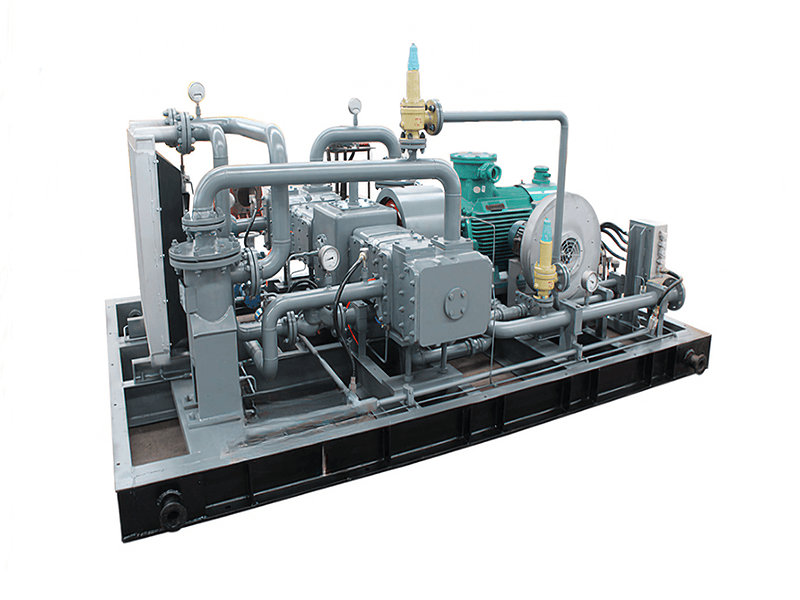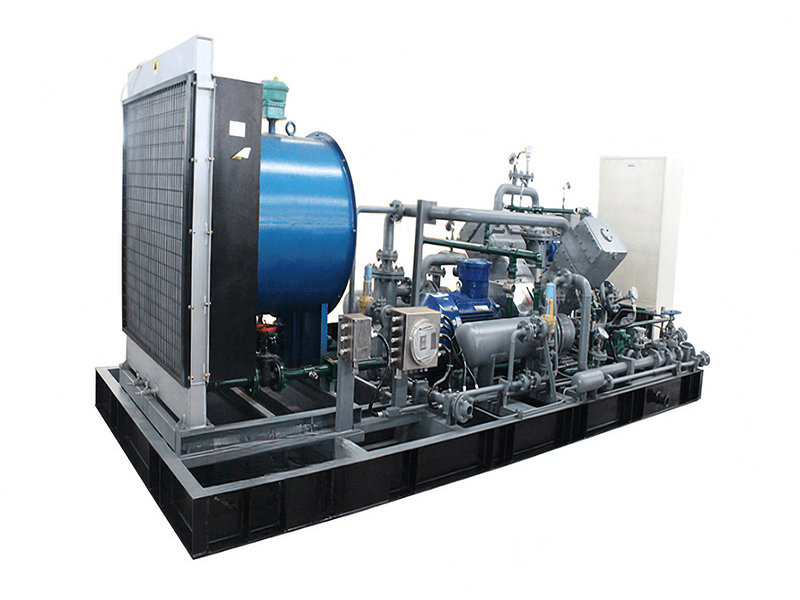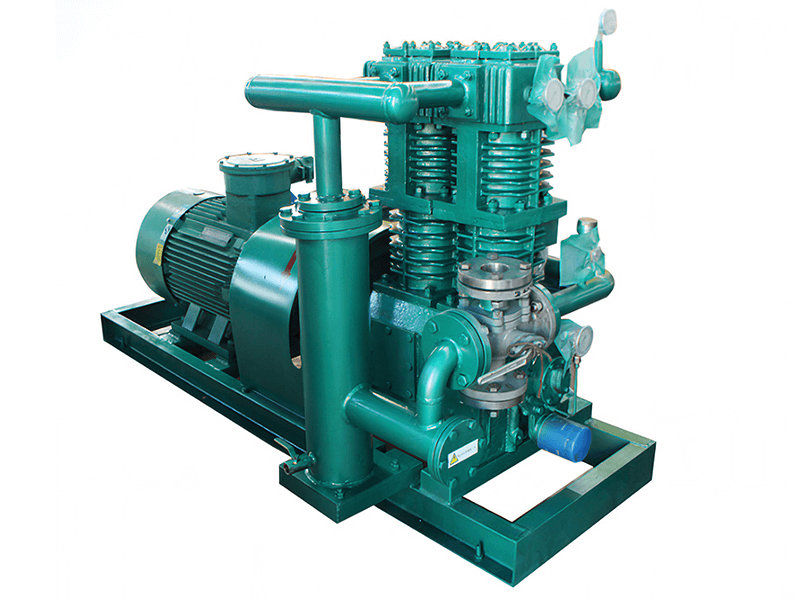Some common faults that can occur in different types of hydrogen compressors
1. Piston Compressors:
- Piston ring wear: Over time, the piston rings can wear out, leading to reduced compression efficiency and increased oil carryover.
- Valve failure: Valves in piston compressors can experience issues such as sticking, improper sealing, or breakage, resulting in reduced efficiency or loss of compression.
- Cylinder scoring or damage: Excessive friction or inadequate lubrication can cause scoring or damage to the cylinder walls, affecting compression performance.
2. Diaphragm Compressors:
- Diaphragm rupture: The diaphragm can rupture due to fatigue, corrosion, or excessive pressure, leading to loss of compression and leaks.
- Valve problems: Similar to piston compressors, diaphragm compressors can experience valve issues such as sticking, improper sealing, or failure, impacting compression efficiency.
- Diaphragm fatigue or wear: Continuous flexing of the diaphragm can result in fatigue or wear over time, leading to reduced compression capacity.
3. Scroll Compressors:
- Scroll wear or damage: The scroll components can wear out or become damaged due to friction, inadequate lubrication, or contamination, resulting in reduced compression efficiency.
- Motor or drive failure: Scroll compressors rely on motors and drives for operation. Faulty motors or drive systems can lead to compressor malfunction or complete failure.
- Scroll misalignment: Misalignment of the scroll components can cause issues such as decreased compression performance, excessive noise, or vibration.
4. Screw Compressors:
- Screw wear or damage: The rotors or screws in screw compressors can experience wear or damage due to friction, inadequate lubrication, or contamination, leading to reduced compression efficiency.
- Oil carryover: Screw compressors rely on oil for lubrication and cooling. Excessive oil carryover into the compressed gas can cause contamination and affect downstream processes.
- Leakage at seals: Faulty seals in screw compressors can result in gas leakage, reduced efficiency, and inadequate compression.

5. Centrifugal Compressors:
- Impeller wear or damage: The impeller in centrifugal compressors can experience wear or damage due to abrasion, erosion, or foreign object impact, leading to reduced compression performance.
- Bearing failure: Bearings supporting the rotating shaft of centrifugal compressors can fail due to inadequate lubrication, contamination, or wear, resulting in excessive vibration and potential compressor failure.
- Seal leakage: Faulty seals in centrifugal compressors can lead to gas leakage, reduced efficiency, and potential safety hazards.
6. Reciprocating Compressors:
- Valve problems: Reciprocating compressors can experience valve issues such as sticking, improper sealing, or breakage, resulting in reduced efficiency or loss of compression.
- Piston ring wear: The piston rings in reciprocating compressors can wear out over time, leading to reduced compression efficiency, oil carryover, and blow-by.
- Crankshaft or connecting rod failure: Faults in the crankshaft or connecting rod can lead to severe mechanical issues, including increased vibration, misalignment, or complete compressor breakdown.
These are just a few examples of common faults that can occur in different types of hydrogen compressors. It's important to refer to the manufacturer's guidelines and engage qualified professionals for maintenance, repair, and troubleshooting to ensure the safe and efficient operation of hydrogen compressors.
The causes of these malfunctions and the methods to avoid them
Here are some common causes of malfunctions in different types of hydrogen compressors, along with methods to avoid them:
1. Piston Compressors:
- Piston ring wear:
- Cause: Insufficient lubrication, improper alignment, high operating temperatures, or contaminated lubricant can contribute to piston ring wear.
- Prevention: Follow manufacturer-recommended lubrication practices, maintain proper alignment, monitor operating temperatures, and ensure clean and high-quality lubricants are used.
- Valve failure:
- Cause: Contaminants, inadequate maintenance, or improper valve clearance can lead to valve sticking, improper sealing, or breakage.
- Prevention: Regularly inspect and clean valves, follow maintenance schedules, ensure proper valve clearance, and use clean and dry hydrogen gas.
- Cylinder scoring or damage:
- Cause: Inadequate lubrication, improper alignment, or contaminants in the cylinder can cause scoring or damage to the cylinder walls.
- Prevention: Maintain proper lubrication, alignment, and cleanliness, monitor operating conditions, and promptly address any issues that could lead to cylinder damage.
2. Diaphragm Compressors:
- Diaphragm rupture:
- Cause: Excessive pressure, fatigue, corrosion, or incompatible materials can lead to diaphragm rupture.
- Prevention: Monitor and maintain optimal operating pressures, inspect diaphragms regularly for signs of wear or damage, use compatible materials, and follow manufacturer guidelines for diaphragm replacement.
- Valve problems:
- Cause: Similar to piston compressors, valve issues can arise due to contamination, inadequate maintenance, or improper sealing.
- Prevention: Conduct regular inspection and cleaning of valves, follow maintenance schedules, ensure proper sealing, and use clean and dry hydrogen gas.
- Diaphragm fatigue or wear:
- Cause: Continuous flexing and cycling of the diaphragm can result in fatigue or wear over time.
- Prevention: Monitor diaphragm performance, follow maintenance schedules, and consider replacing diaphragms as recommended by the manufacturer.
3. Scroll Compressors:
- Scroll wear or damage:
- Cause: Friction, inadequate lubrication, contamination, or foreign objects can lead to scroll wear or damage.
- Prevention: Follow manufacturer-recommended lubrication practices, maintain clean and dry operating conditions, inspect scrolls regularly, and address any issues promptly.
- Motor or drive failure:
- Cause: Electrical issues, inadequate cooling, overloading, or mechanical faults can cause motor or drive system failure.
- Prevention: Ensure proper electrical connections and cooling, monitor motor performance, follow maintenance schedules, and address any issues related to the motor or drive promptly.
- Scroll misalignment:
- Cause: Improper installation, wear, or mechanical issues can result in scroll misalignment.
- Prevention: Follow manufacturer guidelines for installation, conduct regular inspections, monitor performance, and address any misalignment issues promptly.
4. Screw Compressors:
- Screw wear or damage:
- Cause: Friction, inadequate lubrication, contamination, or foreign objects can lead to screw wear or damage.
- Prevention: Follow manufacturer-recommended lubrication practices, maintain clean and dry operating conditions, conduct regular inspections, and promptly address any wear or damage.
- Oil carryover:
- Cause: Inadequate separation or contamination can cause excessive oil carryover into the compressed gas.
- Prevention: Install proper oil separation systems, monitor oil levels and quality, conduct regular maintenance, and ensure proper lubrication practices are followed.
- Leakage at seals:
- Cause: Faulty or worn seals can result in gas leakage and reduced efficiency.
- Prevention: Inspect and replace seals as recommended by the manufacturer, monitor system pressure and performance, and address any leakage promptly.
5. Centrifugal Compressors:
- Impeller wear or damage:
- Cause: Abrasion, erosion, foreign object impact, or inadequate lubrication can lead to impeller wear or damage.
- Prevention: Monitor operating conditions, follow manufacturer-recommended lubrication practices, maintain clean and dry operating conditions, inspect impellers regularly, and address any wear or damage.
- Bearing failure:
- Cause: Inadequate lubrication, contamination, misalignment, or excessive loads can result in bearing failure.
- Prevention: Follow manufacturer-recommended lubrication practices, monitor bearing conditions and temperatures, conduct regular inspections, and promptly address any issues related to bearings.
- Seal leakage:
- Cause: Faulty seals or inadequate sealing can lead to gas leakage and reduced efficiency.
- Prevention: Inspect and replace seals as recommended by the manufacturer, monitor system pressure and performance, conduct regular maintenance, and address any leakage promptly.
6. Reciprocating Compressors:
- Valve problems:
- Cause: Contamination, inadequate maintenance, or improper valve clearance can lead to valve sticking, improper sealing, or breakage.
- Prevention: Regularly inspect and clean valves, follow maintenance schedules, ensure propervalve clearance, and use clean and dry hydrogen gas.
- Piston ring wear:
- Cause: Inadequate lubrication, improper alignment, high operating temperatures, or contaminated lubricant can contribute to piston ring wear.
- Prevention: Follow manufacturer-recommended lubrication practices, maintain proper alignment, monitor operating temperatures, and ensure clean and high-quality lubricants are used.
- Crankshaft or connecting rod failure:
- Cause: Excessive loads, inadequate lubrication, misalignment, or mechanical faults can lead to crankshaft or connecting rod failure.
- Prevention: Monitor operating conditions, follow manufacturer-recommended lubrication practices, conduct regular inspections, and promptly address any issues related to the crankshaft or connecting rod.
In general, to avoid these malfunctions, it is important to follow manufacturer guidelines for maintenance and operation, conduct regular inspections, monitor operating conditions, use clean and dry hydrogen gas, and ensure proper lubrication practices. Additionally, addressing any issues promptly and engaging qualified professionals for maintenance and repair can help prevent or mitigate potential faults in hydrogen compressor.














